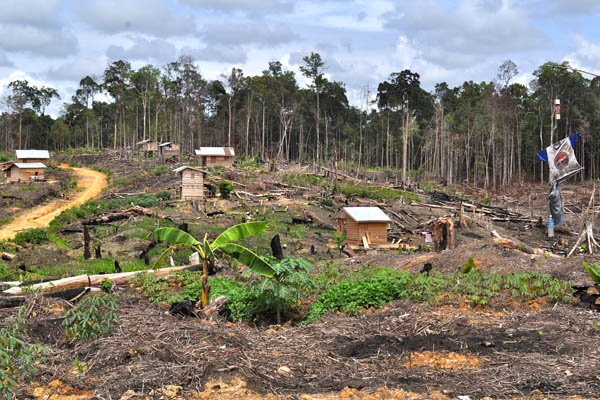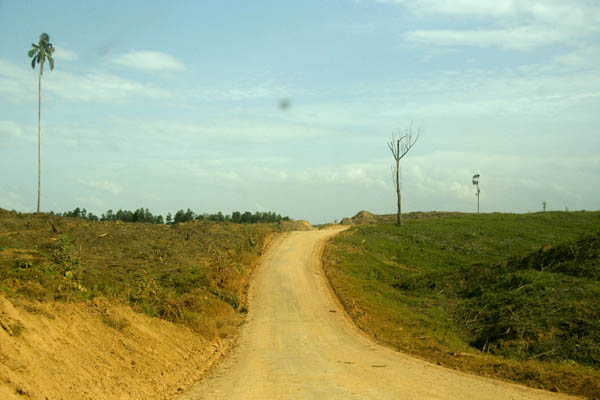A plan for a coal transport road continues to threaten a project to restore one of the last remaining lowland forests in Sumatra. The status of the permit for the road, which would run through the Hutan Harapan (Forest of Hope) ecosystem restoration project, remains in limbo, despite multiple objections by the forest’s concession holders. However, a representative from Indonesia’s Ministry of Forestry has promised to convene a meeting with stakeholders to discuss the issue.
PT Restorasi Ekosistem Indonesia (Reki), the company that holds the restoration permit for Hutan Harapan, has firmly opposed the road project since the plan was hatched in December last year. Under the plan, coal miner PT Musi Mitra Jaya (MMJ) would construct a 51-kilometer road through of the restoration project, which Reki says would remove 154 hectares of forest. As many as 850 coal trucks would use the road each day hauling 100-ton loads, which Reki said would disturb not only the wildlife in the area but also the livelihoods of the 200 indigenous families living inside its concession.
In a meeting on May 3, the Ministry of Forestry pressed Reki to accept an offer of 10 billion rupiah ($900,000) from MMJ as compensation for the road running through its concession. When Reki management rejected the offer, the ministry asked the company to submit a document explaining the scientific reasons for their refusal to the ministry by the end of that month. Reki complied with the request, but, five months later, the company has still not received confirmation from the Forestry Ministry as to whether or not the road project will be allowed to go forward.

Photo: Burung Indonesia
“The compensation figure, it is not comparable to the destruction that would be incurred,” Surya Kusuma, the head of public relations at Reki, told Mongabay-Indonesia on Wednesday last week. “The way the Forestry Ministry and the company view [the situation], it is as if the restoration efforts don’t have any value. As if the forest doesn’t have any value. The extraordinary damage would not compare to the 10 billion rupiah.”
“We urge the Ministry of Forestry not to issue the permit, whatever the reason,” Surya added.
While the ministry has not yet confirmed whether it will issue the permit, it appears that Reki’s concerns are being weighed. Sumatro, head of public relations at the Forestry Ministry, told Mongabay-Indonesia on Wednesday that there has not yet been a decision regarding the permit for MMJ because there are objections from various parties. A meeting to discuss the issue with the Ministry of Forestry and other relevant stakeholders has been planned for the future, Sumatro said.
Reki has held an ecosystem restoration license for the area since 2007, when it received a concession to restore 52,170 hectares of land in South Sumatra province. That area was later expanded by another 46,385 hectares of forest in adjacent Jambi province with a second concession 2010. Although Reki holds the primary concession, a “borrow-and-use” permit can still be issued in the area for the MMJ road project.

Photo: Burung Indonesia
Reki’s 2007 ecosystem restoration license was the first such permit granted by the Ministry of Forestry, and it remains one of just a handful of similar licenses the ministry has issued so far. Restoration licenses were first developed in 2003 and are meant to facilitate an alternate use for degraded production forests, or areas that had previously been zoned for logging concessions. A number of companies have applied for the permits aiming to sell carbon credits, but Hutan Harapan was designed primarily as a conservation site.
Lowland forests are fast disappearing in Sumatra, and the project, which aims to protect and restore the lowland forest within its concession area, receives funding from international donors. Reki, which manages the project, was established through a foundation jointly run by BirdLife International, the Royal Society for the Protection of Birds and Burung Indonesia. Reki has said the road would have long-term negative impacts on the forest ecosystem as well as the indigenous forest dependent people living in the area and is in direct conflict with the company’s restoration license requirements.
Original story: Sapariah Saturi. Jalan Tambang di Hutan Harapan: Reki Tegas Menolak, Kemenhut Bimbang Mongabay-Indonesia. October 23, 2013







